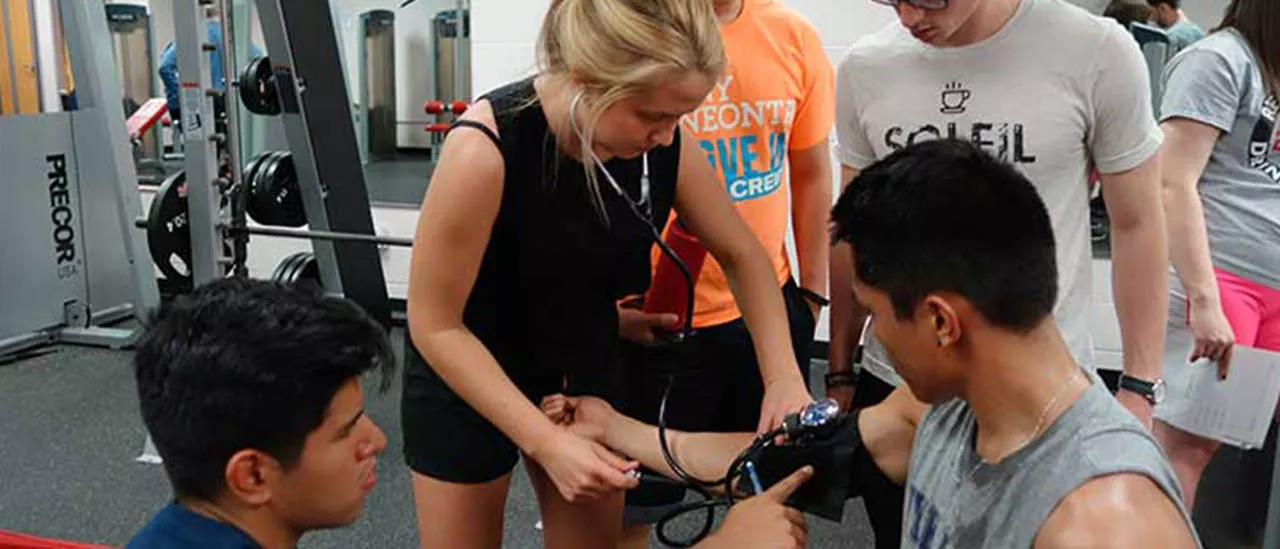SUNY Oneonta's Office of Health Careers provides specialized guidance and support for students preparing to apply to physical therapy school to be a Doctor of Physical Therapy (DPT).
Early Assurance
Highly qualified SUNY Oneonta applicants and students have the opportunity to apply to Upstate Medical University via 3+3 Early Assurance Program or to Russell Sage College via the 4+3 Preferred Acceptance Agreement . Additional information, including qualifying criteria, can be found on our Health Professional School Articulation Webpage.
Who are Physical Therapists?
"Physical therapists are evidence-based, health care professionals who diagnose and treat individuals of all ages who have medical problems or other health-related conditions that limit their abilities to move and perform functional activities in their daily lives. They offer cost-effective treatment that improves mobility and relieves pain, reduces the need for surgery and prescription drugs, and allows patients to participate in a recovery plan designed for their specific needs. In addition, physical therapists work with individuals to prevent the loss of mobility before it occurs by developing fitness and wellness programs for healthier and more active lifestyles.
Physical therapists provide care for people in a variety of settings, including hospitals, private practices, outpatient clinics, home health agencies, schools, sports and fitness facilities, work settings and nursing homes.
As essential participants in the health care delivery system, physical therapists assume leadership roles in rehabilitation, prevention, health maintenance and programs that promote health, wellness and fitness. Physical therapists also play important roles both in developing standards for physical therapy practice and in developing health care policy to ensure availability, accessibility and optimal delivery of health care services"
- ExploreHealthCareers.org
Learn More
For additional information regarding physical therapy school, visit apta.org/your-career.
Acceptance Rate
64% of SUNY Oneonta applicants were accepted into DPT Programs
(2021-2023 PTCAS Advisor Report)
SUNY Oneonta students have recently attended the following DPT Programs: Binghamton University, College of Staten Island, Columbia University, Dominican University New York, D'Youville College, Marist College, Nazareth College of Rochester, New York Institute of Technology, New York Medical College, Russell Sage College, Sacred Heart University, State University of New York (SUNY) Downstate Health Sciences University, State University of New York Upstate Medical University, Stony Brook University, Touro College, Touro University (Manhattan/Long Island), Tufts University, University at Buffalo, State University of New York, University of South Florida, Wingate University.
Prerequisite Courses & Electives
Students must consult SUNY Oneonta's current undergraduate catalog for course descriptions, prerequisites, and time of year when courses are offered to plan properly in advance.
Prerequisites for Physical Therapy School:
- BIOL 1001: Investigative Biology Laboratory
- BIOL 1002: Cellular Perspectives in Biology
- BIOL 1004: Organismal Perspectives in Biology (Preferred) or BIOL 1006: Ecological and Evolutionary Perspectives in Biology
- BIOL 2000: Cell & Molecular Biology
- BIOL 3202: Human Anatomy & Physiology I
- BIOL 3204: Human Anatomy & Physiology II
- CHEM 1111: General Chemistry I
- CHEM 1121: General Chemistry II
- COMP 1000: Composition
- PHYS 1030: General Physics I: Non-Calculus
- PHYS 1040: General Physics II: Non-Calculus
- PSYC 1000: Introductory Psychology
- PSYC 2450: Lifespan Development
- STAT 1010: Introduction to Statistics
A minimum grade of C or higher is typically required in each prerequisite course, however grades of B or higher are recommended. Though a strong application includes a prerequisite and overall GPA greater than 3.3, programs are seeking applicants that are well-rounded in educational and life experience and can articulate an understanding of the career and vision for themselves in the Profession.
Physical Therapy education programs may change course prerequisites at any time and may have additional requirements, preferences, or policies that are not reflected in this prerequisite course list or on the PTCAS Prerequisite Comparison list. Programs may also allow applicants to substitute courses or choose different prerequisites. Applicants should review the PTCAS Directory for program-specific details and contact programs directly to determine whether a particular course will fulfill a prerequisite.
Other courses recommended or required by some physical therapy schools include Exercise Physiology, Pre-Calculus, Speech, Sociology, and additional Psychology Courses.
Students have the responsibility to check entrance requirements for schools to which they intend to apply.
Physical Therapy Program Requirements
Students should regularly review the Physical Therapy School Admission Requirements, including required prerequisite coursework.
Applicants are evaluated via Holistic Review, based on:
- letters of evaluation, to include a Physical Therapist and a Professor in your Major
- leadership skills (on and off campus)
- GPA (specific calculation based on the PTCAS standardization)
- GRE
- Physical Therapist Observation hours (paid and/or volunteer)
GRE Preparation
Many Physical Therapy Programs require the GRE General Test.
- GRE preparation options include free and paid test prep programs
- ETS offers free and paid test prep options
- SUNY Oneonta offers discounted GRE Test Prep
Application Timeline
Application to physical therapy school is made through the centralized application PTCAS.
- The PTCAS Application Cycle opens annually in early July
- applicants are encouraged to apply early as many DPT programs have early September PTCAS submission deadlines
- Additional information is available at the PTCAS Applicant Help Center
Letters of Evaluation
Students generally request two or three letters of evaluation to be submitted on their behalf for physical therapy school applications. Appropriate evaluators include science faculty, other course instructors, healthcare professionals, current or former employers, and professional references.
